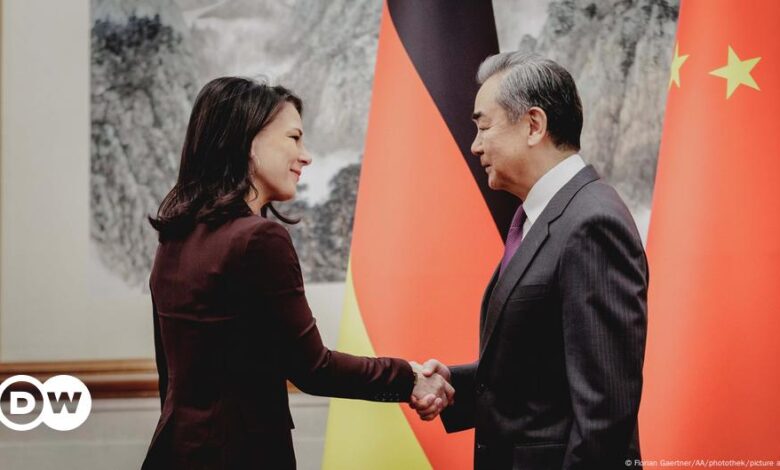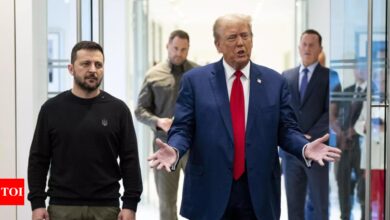Decoding China: What do Chinese people think about Germany? – DW – 12/06/2024

Is Alice Weidel really the most popular German politician in China? The leader of the populist, far-right Alternative for Germany (AfD) party is probably the only member of Germany’s Parliament, the Bundestag, who speaks Chinese.
As a student, Weidel researched and wrote her doctoral thesis on the pension system in China. Many reels about Weidel are circulating on Chinese state-controlled social media.
The designated AfD candidate for chancellor in the 2025 election is popular in China because she opposes US and EU integration policies.
The fact that Weidel could have a chance of becoming German Chancellor is one of countless cliches in China.
The social elite in China is well aware that cooperation between China as the world’s second-largest economy and Germany as the third-largest can only be sustainable if the public has an objective and nuanced image of Germany.
China’s “Annual Development Report of Germany (2024)” was published in mid-November.
The publisher is the German Research Center of Tongji University in Shanghai. Its predecessor, the “German Medical School for Chinese in Shanghai,” was founded in 1907 by the German naval doctor Erich Paulun.
The 386-page study has not taken into account the latest changes in Germany’s politics, such as the coalition government’s collapse, and the upcoming snap elections.
The majority of the data used is as of 2023. Nevertheless, it is very impressive to read how intensively and thoroughly the Chinese researchers are studying Germany.
Germany’s shift toward the right a top topic
One of the dominant themes is the rise of the AfD. According to the authors, many people in Germany are worried about the overall political and economic situation.
The AfD is said to be taking advantage of these concerns to divide and polarize society. “The strong tailwinds for right-wing populism and its party pose huge challenges for the other established political parties,” said Xuan Li, Professor at Tongji University.
Whether the shift to the right can be reversed depends on whether “the other parties manage to respond appropriately to the mood of the electorate,” Xuan said.
The right-wing populists are seen as advocating a new foreign policy that challenges the established “politically correct” alliance with the United States.
After Moscow launched its full-scale invasion of Ukraine, for example, the AfD in the Bundestag called for the abolition of sanctions against Russia. “The political tug-of-war between the AfD and the others will immediately put relations between the US and Germany to the test,” the authors say.
Troubled trans-Atlantic ties
On his trip to the United States in February, Chancellor Olaf Scholz described relations between the US and Germany as “intensive, close and amicable in a way that has probably not been the case for many years and decades.”
As if the political scientists from China had already foreseen the outcome of the 2024 US presidential election, they made a prediction about the future development of the trans-Atlantic alliance before the editorial deadline.
“If Donald Trump were to be reelected, the risk of new disputes and even conflicts arising between Germany and the US in terms of defense and trade would be extremely high,” the authors wrote.
“An appropriate response to the unpredictability of the new US administration would then be a difficult undertaking. After all, we are seeing a surge of nationalism in economic life across borders, from the US to Germany and many other European countries,” they continued.
“This mixture,” they wrote, “will put a heavy strain on the future of relations between Germany and the US and the alliance between the two countries in the Ukraine war.”
The war in Ukraine is also a joint challenge for Germany and China, German Foreign Minister Annalena Baerbock made clear during her trip to Beijing earlier this week.
Both countries face immense hurdles in overcoming common challenges, such as the war in Ukraine, Wulf Linzenich, chairman of the German-Chinese Business Association (DCW), said at the organization’s annual conference in Düsseldorf on Tuesday.
“How can we find a balance between increased cooperation with the US and maintaining an equal partnership with China? The economic engine of the coming decades will undoubtedly be in Asia. Europe will remain an important partner for China in the future. A clear and coherent strategy that takes both sides into account is essential,” said Linzenich.
German ‘de-risking’ from China
Beijing has not really warmed to the Green foreign minister, as the German government’s China Strategy 2023 came from her department.
The strategy defines China as a “partner, competitor and rival.”
According to Beijing, the political focus is more on the latter aspect. It also calls on the German economy to “de-risk,” where dependence on China for critical sectors is to be avoided through diversification.
The authors of the Blue Book, Kou Kou and Shi Shiwei, write that de-risking is expensive and risky.
Germany’s economy would have to pay a high price for the political decision to restrict cooperation with China, its largest trading partner globally for the past eight years, they wrote.
“Germany is now acutely threatened with a slip into recession,” according to the authors. “The leeway in fiscal policy has been exhausted. The German government lacks support for its China strategy within its own ranks and in many other EU countries. The real effects of de-risking fall well short of political expectations.”
‘Made by China’
The authors write that competition is healthy.
“Reform and opening up and objective cooperation without ideological disputes have brought tangible benefits to both partners,” they write. “As the economy strengthens, Chinese companies are competing with the German economy in some areas. But healthy competition does not necessarily have a negative impact on economic cooperation.”
China is irreversibly integrated into the global economy and will continue to have a significant impact on markets and the digital space in the future, Andreas Schmitz, president of the Düsseldorf Chamber of Industry and Commerce, said at the DCW conference. This also applies worldwide to climate protection and the definition of industry standards.
“The People’s Republic continues to be an important market for German and European companies. But China also plays an important role for the European and German economy in terms of raw materials and primary products now, and even more so in the future with regard to the innovative strength of the country and its companies,” continued the IHK President.
“Made in China” was not always meant in a positive way in the past. “Today we say ‘Made by China’. And that is meant positively.”
This article has been translated from German




